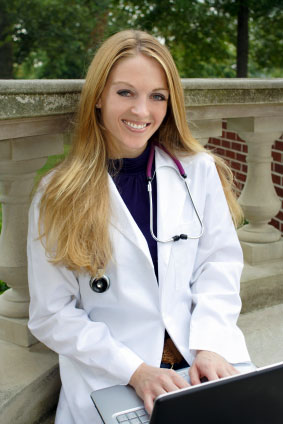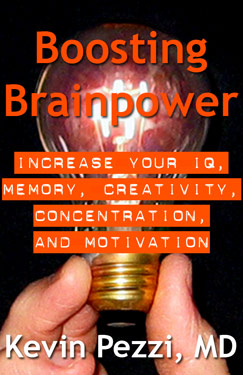She can get into medical school on her own; should she still read my tips?
Q: I think that I am smart enough to get into medical school on my own, without reading your tips on improving intelligence, yet I wonder if I am missing something by not reading them. Am I?
Answer by Kevin Pezzi, MD: Yes. Medicine is one of the few careers in which you're never smart enough or knowledgeable enough. By improving your intelligence and knowledge base, you will become a better doctor able to help more people.
I've worked with doctors who, by definition, were smart enough to be doctors, yet they killed people and injured many others because they were not as smart or knowledgeable as they should have been. I've even seen very good doctors make very tragic mistakes, so it isn't just the poor and mediocre doctors who could benefit from more brainpower.

Furthermore, if you read my tips on augmenting intelligence and memory, medical school will seem easier. While medical school is not a walk in the park for anyone, it can be nightmarishly difficult for the 50% of the students in the bottom half of the class.
Let me take you back many years to my first day of medical school. I was sitting in a vast lecture hall with 255 other students when one of the Deans announced that they were going to put the screws on us and crack down, making med school very rigorous and challenging. He explained that they tried the opposite strategy with the preceding class, but they just took advantage of the lessened pressure and slacked off.
The Dean wasn't kidding about cracking down on us. We were graded on the curve, and some of the exams were so difficult that a passing grade was sometimes around 45%! If you are familiar with typical multiple-choice exams and know how a monkey could often get a score of 25% just by randomly guessing, you may wonder how people who passed those exams by getting less than half of the questions correct could possibly be smart enough to be a doctor. The amount of material we were given was simply staggering; it made college seem like Romper Room. Second, our questions often had far more than the usual four or five choices. Instead, we might be given well over a dozen choices, some of which read like, “e, f, h, and m are true,” or “six of the above are true”—not always easy to differentiate from “five of the above are true.”
Such questions understandably minimize the helpfulness of guessing, so the percentage score more closely reflected one's mastery of the subject. But still . . . a passing score of 45%? Sorry, but in my opinion, those folks were NOT smart enough to be doctors. Nor were the students with scores of 66%, who may have even been in the top half of the class. Getting two-thirds of the questions correct means that one-third are wrong, which is simply too many. I was at or near the top of the class on every exam with scores around 95%, yet even I felt a constant need for improvement.
While writing From Bailout to Bliss, I realized that us citizens of the United States are not as collectively intelligent as we should be. Consequently, it isn't just doctors, or prospective doctors, who could benefit from more brainpower; it's all of us.
Incidentally, the current economic crisis provides an additional incentive for people to read my tips if they want to become doctors. Huh? I'll explain. Years ago, as the drawbacks of medical careers were increasing while other jobs were becoming more appealing, an increasing number of the best and brightest students were siphoned from medicine to other fields. Observing this trend, I correctly predicted that medical schools would have to become less selective. Indeed, that is exactly what happened: to fill their classes, they had to accept students who once would not have stood a snowball's chance in hell of getting into med school.
It typically takes a few years for most people to fully grasp changing conditions and respond to them, so most people who want to get into medical school haven't yet realized how the changing economic climate will affect their chances of acceptance. In a nutshell, here is the take-home message: As more people come to grips with the new economic reality, and as medicine increasingly becomes an even better career choice as other careers lose their luster, more people than ever will flock into medicine—or try to. With more applicants, and especially the return of the best and brightest ones, medical schools can become much more selective again and reject many applicants who once would have been accepted. In other words, the competition for medical school is about to heat up and get even stiffer. If you don't respond to this reality, you may go through life without an “MD” after your name, and struggling to survive.
I went shopping a few days ago at the local mall. I live near an upscale tourist town where many wealthy people live. Other areas of the country have been more affected by the recession/incipient depression than we have, yet even this area has been hit hard. Walking through the mall, I was stunned by the number of vacant businesses. Other businesses in the area, even ones that once prospered for decades, are now failing. Experts predict that the commercial real estate collapse, which is just beginning, will trigger a further blow that will devastate other sectors of our economy. It's going to get very bad, but if you are one of the lucky ones to get into medical school, you will be relatively insulated from the economic crisis. So put your nose to the grindstone, and get busy, now.
Back to the main Question & Answer page

